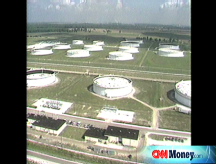Iraqi oil - Gauging the potential for more
Lawmakers want Bush to stop Iraq from contracting with western oil companies to ramp up production. Questions remain about how much crude a modernized Iraqi energy industry could produce.
NEW YORK (CNNMoney.com) -- Two prominent Democratic senators on Tuesday demanded that the Bush administration stop the Iraqi government from signing no-bid contracts with several U.S. and European energy companies to ramp-up the battered nation's oil fields.
But a bigger question remains: Just how much extra oil could a ramped-up Iraqi energy industry produce?
Production could be increased to between 3 million and 3.5 million barrels a day if fields are modernized, which would take at least a year, say some experts. Iraq's current oil production, according to the published number from the U.S. Energy Information Administration, is 2.25 million barrels a day.
Experts differ on how additional oil production by Iraq could stem rising gas prices. By one bullish estimate, it could lower prices at the pump by up to 50 cents a gallon. Another estimates that it would have virtually no impact at all. Analysts note that modernization of the Iraqi oil industry would take years, and that the oil market and the situation in Iraq are volatile.
"There's so much stuff going on in the oil industry every day, that it's kind of hard to guess what would happen in a vacuum," said Erik Kreil, an international oil analyst for the EIA who believes that the fields are already operating close to their maximum output.
Sens. Charles Schumer, D-N.Y., and John Kerry, D-Mass., in asking the Bush administration to stop the Iraqi government from contracting with oil companies, expressed concern about the distribution of royalties from the deal.
They sent a letter to Secretary of State Condoleezza Rice expressing concerns about a contract that the Iraqi government is preparing to sign with Exxon Mobil Corp., (XOM, Fortune 500) Royal Dutch Shell (RDSA), Total SA (TOT), Chevron Corp (CVX, Fortune 500)., BP (BP) and other companies. The contract would let those companies develop Iraq's largest oil fields.
The senators said they are worried that unfair distribution of oil revenue could inflame the violence between the warring religious and political groups of Iraq.
"At this time, the [Iraqi government] currently does not have in place a revenue sharing law that could fairly allocate any revenue gained from Iraq's lucrative hydrocarbon fields between the three major ethnic groups in Iraq," according to the letter. "We fear that any such agreements signed by Iraq's Hydrocarbon Ministry without an equitable revenue sharing agreement in place would simply add more fuel to Iraq's civil war."
Iraq has among the largest oil reserves in the world, with an estimated 115 billion barrels - tying Iran for No. 2 status behind Saudi Arabia's 264 billion barrels, according to EIA estimates.
Iraq's current daily output of 2.25 million barrels is close to what it produced before the U.S.-led war that toppled Saddam Hussein in 2003. But that's still below Iraq's production levels prior to the first Persian Gulf War in 1991. In comparison, Russia produces 9.4 million barrels of crude oil a day, while the Saudis produce 9.2 million and the U.S. produces 5.1 million.
In the current system, royalties on existing fields are paid to the central Iraqi government, while royalties on undiscovered and undeveloped fields go to the regions where they're located. Sunnis tend to have a greater presence in regions without oil and to support royalties going to the central government. Kurds, who dwell predominantly in the oil-rich north, and Shiites, who are mostly in the oil-rich south, tend to favor distribution based on the regions.
Experts believe that Iraq has undiscovered fields that could yield up to 6 million barrels a day, but it would take up to 10 years to develop the infrastructure to support the increased production.
In their letter, the senators said that Iraq's oil revenue during 2007 and 2008 will total $100 billion, "most of which will not be spent on reconstruction due to bureaucratic incompetence."
In theory, the immediate release of an additional 1.25 million barrels a day from modernized fields could lower gasoline prices by 40 to 50 cents per gallon of gasoline in the United States, according to Doug MacIntyre, senior oil analyst with the EIA. MacIntyre based this estimate on 100,000 barrels of oil equaling 4 to 5 cents per gallon of gas in today's market. But he said these numbers might not apply in the future, when or if the fields are modernized.
Peter Beutel, oil analyst and president of energy market data firm Cameron Hanover, said the additional oil could lower gas prices by 20 cents a gallon, which is lower than MacIntyre's estimate but still bullish. But Beutel said any increase would be at least a year away, assuming that it happens at all. Also, he said the oil industry and the situation in Iraq are notoriously unpredictable.
"There is no supply available anywhere that is going to be coming on line in the next three months that would turn this market around," said Beutel. ![]()




